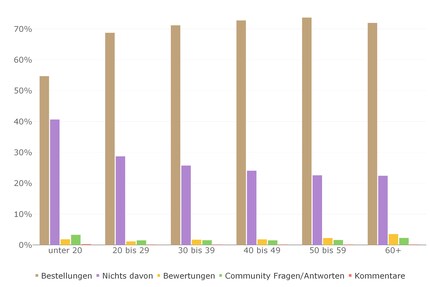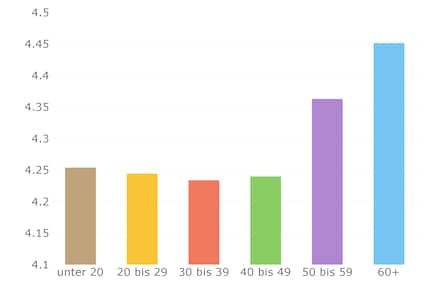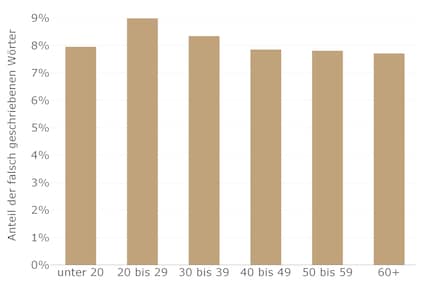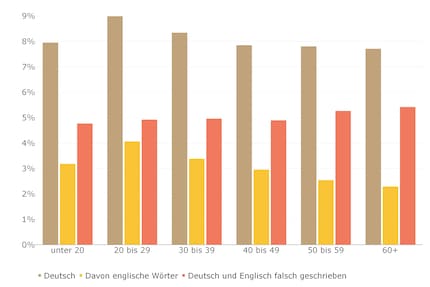
Background information
5 good reasons to start the year with sports for all the family
by Michael Restin

It's time to get to know you better. What kind of people are behind the more or less creative usernames? Good-natured LEGO lovers, it seems.
Do-It-Aunt, Star Wars denier, "Animal hater", Chaos queen. Meanwhile, you know me a bit through my articles. But I hardly know anything about you, our Galaxus community. Time to turn the tables and put you in the spotlight. To do this, I'm going to use our data from the whole of 2019. Don't worry, you're nothing more than a per mille in beautifully presented percentage figures. Only you will recognise yourself. In order to be able to make more or less meaningful statements, I break down each category by age group. After all, 60-year-olds rarely tick like under-20s.
Whoever sets up a profile on Galaxus primarily wants to shop. At least that's what I thought. In every age category, there are at least 20 per cent who have never interacted in any way. Among the under 20s, it's even more than 40! Is it considered cool among young people to come out as a Galaxus community member? Will we soon overtake TikTok and Snapchat? I'm already dreaming. All you have to do to really get there is dare to use your profile.

Despite this significant number of bums, pure shoppers are by far the largest group. It is interesting to note that the number of reviews and Community questions and answers increases from 60 onwards. Apparently you take more time for the community after retirement. Nevertheless, the comment function is far from being suitable for the masses. So far, only a few have reserved this right for themselves.
A lot has happened to first names over the decades. From Ursula to Michelle and from Peter to Noah. The trends that are emerging in the Community are representative of Switzerland as a whole. The analyses by the Federal Statistical Office look pretty similar. There are a few outliers like Michelle in the U20 women's category, but on the whole, your parents were not very imaginative.

There's one thing you all have in common: LEGO. Whether for yourself, for your own children or grandchildren or for the birthday of some neighbour's children, the bricks always fit. Community members over 60 seem to have an extraordinary amount of hair growth, which they have to keep in check with a razor. Once that's done, they brush their teeth. Always. Under 20, mobiles are more important than oral hygiene, so they are always packed in cases. Also always with you: a water bottle filled with still water, which is safely stowed in the Kanken. You don't really think about having children until you're 30, then it's over at 50. All children should be out of the house by the time you retire at the latest.

You are generous across the board. You all give an average of over four out of five possible stars. Nevertheless, the phenomenon of ageing is noticeable in the statistics. After 60, the stars are even looser. The falling testosterone level makes you more relaxed and stops you from finding fault with everything.

A tendency towards words with positive connotations can be seen in the comments - even if we editors may not always feel that way. The focus on the negative is human, just look at the headlines of any online newspaper. When I replace the negativity bias with hard facts, I quickly realise that positive words such as "good" and "thank you", as well as neutral words such as "Galaxus" and "article", clearly outperform negative words such as "difficult" and "problem". And in every age group. Interesting: among young people, "panties" has secured a top spot. Sex seems to sell incredibly well, especially among the under 20s.

All the comments and ratings, Community questions and answers are wonderful not only for lively interaction, but also to check your spelling. How good are you at spelling correctly? Does "namely" have two "h "s or not? The answer: No, and on average you're doing quite well. At just under 9 per cent, the error rate is highest among 20 to 29-year-olds. This decreases with increasing age - at first glance.

The controversial Anglicisms slightly distort the result, as these are counted as errors in the check for German spelling. As soon as they are considered correct, a different picture emerges. From the age of 60, the errors pile up. Whether the reason for this is a certain nonchalance towards the topic or an actual lack of knowledge cannot be proven. But what can be proven is this: Most Anglicisms are used between the ages of 20 and 30.

Anyway, so this is you, the Galaxus community. Did you recognise yourself in it or are you swimming completely against the tide?
My life in a nutshell? On a quest to broaden my horizon. I love discovering and learning new skills and I see a chance to experience something new in everything – be it travelling, reading, cooking, movies or DIY.
Interesting facts about products, behind-the-scenes looks at manufacturers and deep-dives on interesting people.
Show all